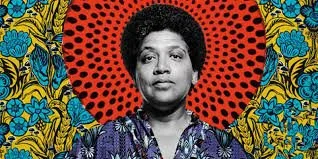Intersectional Theology
Intersectional is the recognition of multiple identities interlocking with structures of power and oppression. People experience always and at once their gender, race, sexual identity, ability, age, social class, nation, and religion and these intertwined identities locate them in relation to structures of power and domination.
Because all theology is done by people the experiences of people in the social location of people are always intertwined in what they are able to see theologically and also what they are unable to see theologically. Within intersectional theology it is important to center those voices that society seeks to silence through domination and power structures and de-center the ideal or “norm” that has been created by structures of power in society.
Audre Lorde identified the American “Mythical norm” as “white, thin, male, young, heterosexual, Christian, and financially secure” and warned that people could not simply identify only the way(s) they are outside the mythical norm but they must also acknowledge the ways they benefit from the facts of identity that reside within the mythical norm.
This lens helps us see the history and effects of imbalanced power relations and De-naturalizes oppression by uncovering its operations. This means that often times our theologizing must begin by questioning the assumptions that are rooted in the norms of dominant culture, we must intentionally pursue justice, and embrace the contradictions refusing to do theology as usual.
“A truly intersectional theology is messy. It encompasses all the contradictions, differences, and difficulties of human experience, and that means that sometimes we won’t find a direct line from point a to point B to ultimate truth. Instead, we will find questions, people who are nothing like us, ideas that terrify and challenges.”
“Intersectional theology does not seek to articulate ultimate truth claims but rather destabilizes fixed notions of theological truth by offering multiple and competing statements of experience and understanding across and within differences and evaluating those statements through a lens of justice…this explains that this approach creates openness to engage authentically across differences without needing an assimilating sameness to underlie our diverse experience…we must learn how to understand differences without turning them into sameness.”
Intersectional theology recognizes that everyone is a theologian and their theology is formed through the lens of their multiple identities and these identities relation to power. This means the sum of our theology is greater than each of the individual parts, as our perspective is limited and objective. This means the work of developing our theology is done in conversation and is enriched by our solidarity and our diversity. This also means that when we say our theology we aren't just speaking about a universal theological position but rather our collective interpretation and understanding of who God is and what God is like keeping in mind proximity to justice.
One of the beautiful parts of intersectional theology is that it is in and of itself a form of spirituality because it is thoroughly committed to the practice of self reflection. It forces us to understand our own identities and all their complexities along with our social location and the impact that has on what we are able to see and what we are unable to see.
Intersectional theology prioritizes justice and liberation which means the work of our theology and the practice of our spirituality should always lead to justice and liberation.
“As Vivian May argues, intersectionality as a theory and a method is biased toward justice. Likewise, intersectional theology is also biased away from dominance and towards justice, and so we evaluate the worth of diverse theology is based on their ability to further the goals of liberation of all people.”




